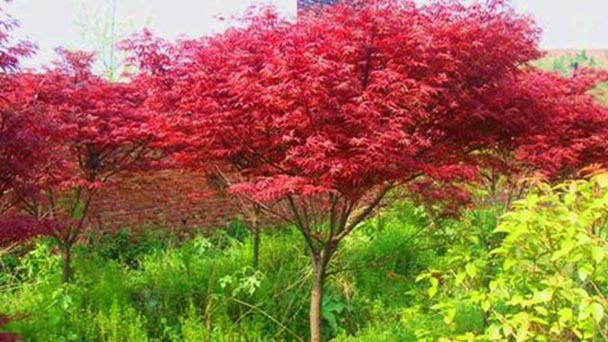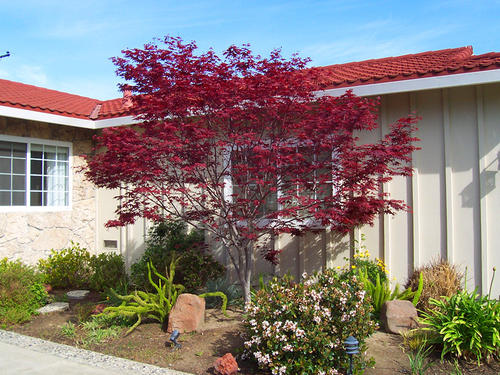How to propagate Japanese maple
Written by Maggie
Mar 23 2021

Japanese maple is a maple tree. Japanese maple likes sunshine, suitable for the warm humid climate, afraid of strong sunlight, a hardy, a drought, waterlogging resistance, was born infertile osteoporosis well-drained soil, suitable for rare foliage trees, often as a potted plant. Let's take a look at together Japanese maple propagation methods!

Japanese maple is one of the best evergreen plants for containers
Japanese maple cutting propagation method
Japanese maple is available for cutting propagation, especially when making small bonsai or potted plants. The cutting propagation is carried out in the hot rainy period. Choose the current strong principal about 20 cm for the cutout, quickly dipped in 1000ppm naphthalene acetic acid powder, insert into vermiculite or perlite and pool mud half of the matrix, pay attention to shading, spray moisture, about 1 month later can be gradually rooted. If there is the condition of all-light spray, 2 years old branches can be used to take root, and the survival rate is high. After transplantation, to shade, after half a month can gradually accept the sun, and strengthen the management of water and fertilizer.
Japanese maple sowing propagation method
Japanese Maple seeds are not dormant and can be sown in autumn or spring. This article mainly introduces spring sowing. The appropriate Japanese maple sowing propagation time is in spring. Before sowing propagation of Japanese maple, the seeds should be thoroughly mixed with wet sand at a ratio of 1:3 and placed at 3-5 ℃ for a month of low-temperature sand storage treatment. During stratification, regular inspection and management should be carried out. When we apply sowing propagation of Japanese maple, first fill the foot water in the border and then sow under the water seepage, the sowing amount is about 200 grains per square meter. After sowing to cover 0.5 cm of fine soil, to improve soil moisture, so that the seed bud early, bud neat, can be covered with plastic film or a small arch shed, the arch shed should pay attention to ventilation, noon temperature over 30℃ to appropriate shade.
Japanese maple grafting propagation method
Japanese Maple can be propagated by grafting, and 2 - to 4-year-old Acer japonica seedlings can be used as rootstocks. The grafting propagation of Japanese maple should be performed in spring, and the height of rootstocks can be determined according to the needs. The grafting propagation of Japanese mapleis carried out in the plum rain season in summer, and the leaves are cut off in autumn. Japanese maple grafting propagation method is only used for a few precious varieties. Sprout grafting of Japanese maple is the most common application, and the best time is in summer and autumn. In early summer, branches are in a vigorous growth period. In addition, the Japanese Maple cortex is thin and bud grafting is small, so regular spray moisturizing should be applied after pressing, in order to improve the survival rate. The bud grafting propagation method of Japanese maple is basically the same. After a week, if the petiole falls at a touch, it means that it has survived, otherwise it should be supplemented.

Latest Updated
- Benefits of Bugleweed - 7 Science-backed Health Benefits
- Bugleweed Dangers & Side Effects - Is It Poisonous?
- How to Plant Evergreen Trees - What You Should Know
- When to Plant Evergreens - Grow Guide for Evergreen Trees
- 12 Wonderful Evergreen Shrubs for Your Garden
- 12 Popular Evergreen Plants with Pictures for Beginners
- When And How To Prune A Lilac Bush Like a Pro
- How to Grow & Care for Lilac Vine (Hardenbergia Violacea)
- Japanese Lilac Tree (Syringa Reticulata) Care & Propagation Guide
- Shumard Oak Pros and Cons - What to Know
Popular Articles
- Winter maintenance of Antirrhinum Majus
- How to Grow Terminalia Mantaly Tree
- How to Grow and Care for Crossostephium Chinense
- How to grow Antirrhinum Majus in spring
- Peristeria Elata (Dove Orchid) Profile: Info & Care Guide
- Underwatered Snake Plant (Sansevieria Trifasciata) - Signs And How To Fix
- How to Care for Brazilian Jasmine Plant (Mandevilla Sanderi)
- How to Grow & Care for Graptopetalum Purple Delight in Summer
- Rosa Chinensis (China Rose): Plant Growing & Care Tips
- How to Care for Baby Sun Rose (Aptenia Cordifolia)